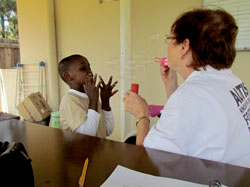Initial Impressions from Kenya
August 20, 2015
Initial Impressions of Kaizora (meaning "childhood" in Sanskrit)
 As we drove down a bumpy dirt road I could see in the distance a guard standing at a metal gate; he wore a dark blue suit with black boots, and there was a small fire nearby to keep him warm. On the other side of the fence, I could make out a sign that read Kaizora. He spoke in kiSwahili asking where we were going, the driver answered "sawa-sawa, Kaizora" (meaning "it's okay" or "no worries"), and the guard replied "asante" (meaning "thank you"), and he opened the gate. I would soon come to understand that gates and guards are extremely common in this area. We continued down the dirt road until we reached a small house with a fenced yard: the Center where I would be spending the majority of my time. A garden of vegetables and herbs and colorful flowers lined the pathway to the front door; through the windows I could see staff members sitting around a table reviewing documents, all of them wearing shirts that read "Kaizora: Giving every special child a special childhood."
As we drove down a bumpy dirt road I could see in the distance a guard standing at a metal gate; he wore a dark blue suit with black boots, and there was a small fire nearby to keep him warm. On the other side of the fence, I could make out a sign that read Kaizora. He spoke in kiSwahili asking where we were going, the driver answered "sawa-sawa, Kaizora" (meaning "it's okay" or "no worries"), and the guard replied "asante" (meaning "thank you"), and he opened the gate. I would soon come to understand that gates and guards are extremely common in this area. We continued down the dirt road until we reached a small house with a fenced yard: the Center where I would be spending the majority of my time. A garden of vegetables and herbs and colorful flowers lined the pathway to the front door; through the windows I could see staff members sitting around a table reviewing documents, all of them wearing shirts that read "Kaizora: Giving every special child a special childhood."
Before I started working for AUCD, I spent many years working in a variety of service agencies (both public and private) for individuals with disabilities in the United States. Most recently, I completed a fellowship at a LEND program at Oregon Health and Sciences University in Portland. Based on all of my previous experiences, I'm quite comfortable walking into treatment clinics for children with intellectual and developmental disabilities. They tend to be colorful, vibrant, and well-stocked. I'm used to going into clinics with playrooms full of toys, swings, and playground equipment. I didn't even realize the magnitude of my expectations until I walked into a behavior clinic in another country.
When I first walked into Kaizora Consultants in Nairobi, I was surprised by two things-1) how sparse and minimal the environment was and 2) how it was simultaneously so full of life. I was surprised by how few resources were available. There were no swings, no toy closets packed with extra supplies, no overflow rooms with piles of adaptive equipment. In fact, on my first day, the Global Autism Project team was conducting an ABA assessment which literally required all the materials in the Center. Though the environment was not that of the standard I was used to, lacking unlimited amounts of tangible therapy materials, the walls were painted bright colors, the echoes of the therapists' enthusiasm and love for the kids filled every room, and the dedication of the staff was palpable. Given the amount of jet lag and culture shock I was experiencing, the contrast was overwhelming. How could there be so much excess and lack existing in the same space?
I was immediately struck by the fact that what they lacked in resources, they made up for in passion. The staff demonstrated a passion and drive for helping these children that fueled my own enthusiasm. The fact that they were doing so much with so little was inspiring. Yet I could also see that they were often spread thin, both in terms of their material and immaterial resources. The director of the Center is the only Kenyan behavior analyst in the entire country. There is literally one other BCBA in the country, who is here temporarily, for her to consult with and draw professional support from. None of the staff had formal behavior analytic training before they came to Kaizora. The therapy resources that we might easily acquire in the United States for $30US cost $12,000 Kenyan shillings (the equivalent of $120US). In a city in which the minimum wage ranges from approximately $100 to $200 shillings ($1-2US) per hour, I could hardly imagine their ability to do so much with so little. Yet, I could see that they were making remarkable changes in the children's lives, and I couldn't wait to learn more about how they were doing it and how I could contribute to such an amazing organization.
"A leader is best when people barely know he exists, when his work is done, his aim fulfilled, they will say: we did it ourselves." - Lao Tzu







